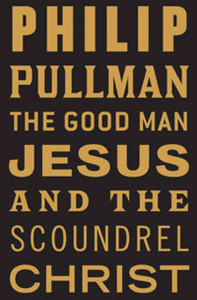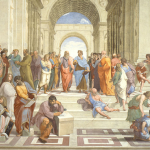“The Good Man Jesus and the Scoundrel Christ”
by Joseph Bottum
Filed under Book Reviews
The Good Man Jesus and the Scoundrel Christ
By Philip Pullman
Canongate, 256 pages, $24
Teenage sex will save the world—teenage sex, in all its precocious power, in all its precious emotion, in all its self-confirming belief that, because something is felt so deeply, it must be a deeply meaningful thing. If that seems a somewhat prurient thought for a middle-aged author, it is nonetheless the final revelation of the His Dark Materials trilogy, the set of children’s books written by Philip Pullman between 1995 and 2000.
 And the primary threat from which these teenagers will save us? Organized religion, as it turns out: the great, power-hungry, fascistical force that wants to strip the joy and wondrous anarchic energy from sex. Every time a pair of children sneak off for a bundling, they are engaged in an act of protest—fornicating truth to power.
And the primary threat from which these teenagers will save us? Organized religion, as it turns out: the great, power-hungry, fascistical force that wants to strip the joy and wondrous anarchic energy from sex. Every time a pair of children sneak off for a bundling, they are engaged in an act of protest—fornicating truth to power.
There is much more to the His Dark Materials books, of course, and through the course of them—The Golden Compass, The Subtle Knife, and The Amber Spyglass—Pullman proves himself a fantasist of considerable talent and wide-ranging invention. But this is what it all comes down to, in the great denouement of the story; this is how it cashes out, as Pullman set himself to become the anti–C.S. Lewis, to undo Christianity for the young, and to refute what he called, in Lewis’ Narnia books, “one of the most vile moments in the whole of children’s literature.”
Then, in 2004, Pullman ran across the archbishop of Canterbury, Rowan Williams, who observed that Pullman’s children’s books may be a reasonable attack on religious abuses, but they lacked any sense of Jesus. The gentle attention flattered the fantasist, who, in response, has now published his answer: The Good Man Jesus and the Scoundrel Christ—an adult novel that begins, “This is the story of Jesus and his brother Christ, of how they were born, of how they lived and of how one of them died.”
Ah, me. In Pullman’s novelistic version, a naive young woman named Mary delivers two boys. The first of the twins turns out to be Jesus, a wise preacher of moral truths who comes to realize the lack of God from those truths only on his way to crucifixion. The other twin is Christ, a darker, smarter boy who grows up to become the founder of the Church based on his brother and who negotiates power with the Romans and the priests. He is also his brother’s Judas—Christ betraying Jesus to get him out of the way so Christ can go on to establish Christianity.
Read the rest of the review.
Related Posts
Note: Our goal is to cultivate serious and respectful dialogue. While it's OK to disagree—even encouraged!—any snarky, offensive, or off-topic comments will be deleted. Before commenting please read the Commenting Rules and Tips. If you're having trouble commenting, read the Commenting Instructions.












